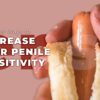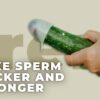Dealing with erectile dysfunction (ED) can be a sensitive and challenging issue for both partners in a relationship. When a man experiences erectile dysfunction, it can diminish his self-esteem and confidence, and increase stress levels, especially if he fears it may indicate a more severe condition. This can affect the couple’s sense of intimacy both inside and outside of the bedroom.
However, ED is not anyone’s fault. In fact, research suggests that around 40 percent of men are affected by ED by the time they reach 40 years of age. ED can impact both partners and addressing it together is the first step toward overcoming it. It’s crucial to emphasize open communication when navigating this situation. Additionally, there are ways to maintain a strong bond with your partner while he seeks treatment for ED. Having ED doesn’t mean the end of a relationship; a relationship can grow stronger despite it.
What to do if Your Boyfriend has ED?

If your partner is struggling with ED, offering support can make a significant difference. However, it’s crucial to approach the subject delicately to avoid discomfort. Here are some Tips if your partner has erectile dysfunction
1. Open Communication
The first step towards addressing erectile dysfunction is to establish open communication with your partner. Although it may be uncomfortable and emotional, it’s crucial, to be honest with each other about the issue and how it impacts your relationship.
To initiate this conversation, it’s recommended to give your partner a heads-up and schedule a time that works for both of you. When discussing ED, approach it from a place of empathy, love, and care. Use language that conveys appropriately how it’s affecting you.
Sharing your fears can help prevent your partner from becoming defensive during the conversation. Additionally, asking your partner to share their thoughts and feelings about the issue is important.
2. Understand That It’s Common Issue
It’s common for men to feel embarrassed about erectile dysfunction since it’s not a topic that’s commonly discussed. However, ED is prevalent among men of all ages. One way to make your partner feel less awkward about the situation is by highlighting how widespread erection issues are.
You can point out that tens of millions of men in the US alone and hundreds of millions worldwide experience ED. By doing so, you can help your partner feel less isolated and understand that ED is a common and normal issue that many couples face. This can make it easier for both of you to acknowledge the issue and focus on finding solutions.
3. Visit Your Doctor
Motivate your partner to schedule an appointment with a doctor to identify the potential causes and solutions for his ED. This visit can help him discover underlying factors that he may not have been aware of. ED could stem from various reasons, it could be a side effect of a medication he’s taking or workplace stress. During the appointment, his doctor can discuss various treatment options.
4. Let Your Partner Know You’re Supportive of ED Treatments
Having erectile dysfunction can be challenging for your partner. They may hesitate to seek treatment because of their fears and concerns about taking medication. ED drugs such as sildenafil, tadalafil or avanafil are known to be effective in improving sexual function. However, some men might be hesitant to try them.
Some men feel that ED medications are only for older men and are worried about how their partners might respond to them. To help your partner feel comfortable seeking treatment, let them know that you support their decision to use medication.
Even if it may not seem like a significant issue to you, showing your support for your partner’s decision to use medication can have a positive impact. Your approval can help them overcome mental barriers that stopped them from seeking treatment.
5. Maintain Intimacy And Connection
Consider exploring ways to maintain intimacy and connection with your partner. While sexual intercourse may be important to both of you, there are other ways to feel close and satisfied without it.
Physical pleasure doesn’t necessarily require an erection, and it’s helpful to shift the focus away from intercourse. You could take a break from intercourse for a specific period, such as a week or a month, to relieve any performance pressure.
Instead of intercourse, there are plenty of other intimate activities you could engage in. This can include kissing, cuddling, massages, sharing fantasies, watching porn together, or exploring erotica. If you focus on having fun and connecting your sexual relationship may become more comfortable and satisfying.
6. Sex Therapy
Seek help from a qualified counselor specializing in sex therapy. They can help you with maintaining intimacy, coping with emotional challenges, and reconnecting while dealing with erectile dysfunction in your relationship.
While a sex therapist may not be able to cure ED, they can help normalize the emotions and encourage exploring alternative ways to maintain intimacy. Together, you can find new ways to experience pleasure beyond just intercourse.
7. Weight Loss And Regular Exercise
Excess weight can contribute to ED in many men. Losing weight and regular exercise can potentially improve your sex life. According to a study in the Journal of the American Medical Association, a calorie-restricted diet and regular exercise may help treat ED in obese men. Regular exercise can also make you feel better, make your muscles stronger, and improve your heart health. This can help you have a healthy sex life.
Certain types of exercise, such as pelvic floor exercises, may be particularly helpful in treating ED. As reported in the journal Sexual Medicine, these exercises, also known as Kegel exercises, can be beneficial for urinary and bowel incontinence.
8. Relax
One of the major causes of ED is anxiety. Sometimes, anxiety may have a greater impact on ED than physical issues. When you are concerned about your ability to perform well in bed, it is less likely that you will enjoy your time. This can create a cycle of disappointment.
To address this, don’t focus on ED when you’re being intimate with your partner. Instead, try to enjoy your time together. Deep breathing exercises can help you relax. Massaging techniques can also provide you with simple pleasure and relaxation through touch. By relaxing more, you’ll be better prepared for a satisfying and stress-free sexual experience.
The Do’s and Don’ts of Discussing ED With Your Partner
When talking about erectile dysfunction with your partner, be sensitive to their feelings. Avoid certain topics that may lead to blame or negativity. Here are some tips to help you have productive conversations and focus on making progress together:
- Do initiate an open conversation about ED with your partner. Ignoring the issue won’t make it go away, so it’s important to discuss it openly and honestly with your partner.
- Don’t assign blame to your partner for their ED. Remember that it’s a medical issue, and not a reflection of their masculinity or sexual attraction to you. Use kind and compassionate language to avoid making your partner feel guilty or ashamed.
- Do ask your partner how you can support them. When ED occurs in a relationship, it can be an opportunity for you to work together to find a solution. Let your partner know you’re there for them and willing to help in any way you can.
- Don’t be pushy or insist on doing things your way. Listen to your partner’s perspective and allow them to share their thoughts on the causes and potential solutions for their ED. Being understanding and supportive can help your partner feel more comfortable opening up to you.
- Do inform your partner about available treatments for ED. It’s possible that your partner may not be aware of the different options for managing their condition. Share information about medications, healthy habits, or other treatments that could help improve their sexual health.
- Don’t pressure your partner to seek professional help for erectile dysfunction immediately. Dealing with ED can be stressful and overwhelming, and your partner may need some time to process their thoughts and feelings before considering treatment. Offer your support and understanding as they navigate this issue.
Can a Relationship Survive ED?

Is it possible for a relationship to endure despite erectile dysfunction? Absolutely. You can improve your sex life by talking openly about what you want and need. This might involve being vulnerable. Together, you can decide if medical treatment or counseling, either alone or as a couple, can help.
If your husband has erectile dysfunction, there are many treatment options available to consider. These include:
Medical Interventions
1. Oral medications
Medications like sildenafil (Cenforce), tadalafil (Cialis), or vardenafil (Filitra) are commonly used to treat ED. These medications work by increasing blood flow to the penis, helping to achieve and maintain an erection.
2. Testosterone therapy
Low testosterone levels, which can affect arousal, can be detected through blood tests. In this case, supplemental testosterone may be used to help. Testosterone replacement therapy can be used in combination with oral drugs.
3. Injections and intraurethral medication
Medications that are either injected into the penis or inserted into the urethra can also enhance erections. Injectable alprostadil, sold under the brands Caverject, Edex, and Prostin VR, is a common injection that can help those with ED. Some injections can be administered at home through self-injection.
4. Penis pump
A “vacuum erection device” or penis pump helps to draw blood into the penis and temporarily maintain it there, enabling your partner to stay hard.
5. Surgery
In certain cases, a penile implant (either silicone-based or inflatable) may be recommended.
6. Supplements
This category is tricky because many male enhancement products, including those labeled as “herbal” contain unlisted ingredients, according to FDA warnings. There are also concerns about contamination. Before taking any medications, including supplements, it is best for your partner to first consult with a doctor.
Psychotherapy and Counseling
1. Sex Therapy
Sex therapists can help individuals and couples address psychological and emotional factors that may contribute to ED. They can provide guidance on techniques to reduce anxiety, enhance communication, and improve sexual satisfaction.
2. Couples Therapy
Involving a couples therapist can help address relationship dynamics, improve communication, and foster emotional connection. This can positively impact sexual intimacy.
Lifestyle Changes
1. Regular Exercise
Encouraging your boyfriend to engage in regular physical activity can improve overall sexual health, reduce stress, and enhance blood circulation. These activities can have a positive effect on erectile function.
2. Healthy Diet
A well-balanced diet that includes fruits, vegetables, whole grains, lean proteins, and healthy fats can support cardiovascular health and contribute to better sexual function.
3. Stress Management
Stress can contribute to ED. Encourage stress-reducing activities such as relaxation techniques, meditation, yoga, or hobbies that help him unwind.
4. Avoidance of Substance Abuse
Excessive alcohol consumption, smoking, and recreational drug use can negatively impact erectile function. Encourage your partner to limit or avoid these substances.
Causes of Erectile Dysfunction
Erectile dysfunction can have various causes. Physical causes may include
- heart disease,
- atherosclerosis (clogged arteries),
- type 2 diabetes,
- high blood pressure,
- chronic kidney disease, and
- injuries affecting the penis and surrounding areas
- hormonal imbalances, such as low testosterone.
- Peyronie’s disease, a condition that causes curved, painful erections due to the formation of scar tissue in the penis
- neurological conditions that affect nerve function, and operations affecting the bladder, colon, or prostate can also impact the ability to get or maintain an erection.
These conditions can lead to ED by damaging blood vessels, affecting blood flow to the penis, or compromising nerve function.
Psychological causes may include
- anxiety,
- depression,
- feelings of guilt,
- low self-esteem, or
- ongoing stress,
making it more challenging to get and maintain an erection.
Additionally, ED may result from some health-related behaviors, such as taking specific medications or engaging in certain habits, such as smoking, consuming excessive alcohol, or being overweight.
Final Thoughts

Active treatment can lead to an improvement in ED. Sexual intimacy is necessary for a happy and healthy relationship. Medical conditions like ED can cause problems in a relationship. Fortunately, with consistent treatment, most men are able to overcome erection issues. They can enjoy a fulfilling sex life, leading to a better quality of life.
If your partner is experiencing ED, don’t hesitate to offer your support. Use the tips and techniques mentioned above to discuss the issue with them. Show your concern, and provide them with the necessary resources and information to seek treatment. With a partner who is supportive and understanding, most men will feel encouraged to seek treatment for their ED.
References
- Erectile Dysfunction [Fact Sheet] https://www.theurologyfoundation.org/urologyhealth/male-reproductive-organs/erectile-dysfunction
- Drugs that may cause erection problems [Fact sheet] https://medlineplus.gov/ency/article/004024.htm
- Bite-Sized Guide to Erectile Dysfunction [Fact Sheet] https://www.theurologyfoundation.org/images/2018_Bitesize_Guides/181120_-_Bitesize_Guide_to_ED.pdf
- Esposito K, Giugliano F, Di Palo C, et al. Effect of Lifestyle Changes on Erectile Dysfunction in Obese Men: A Randomized Controlled Trial. JAMA. 2004;291(24):2978–2984. doi:10.1001/jama.291.24.2978 https://jamanetwork.com/journals/jama/fullarticle/198993
- Dorey G, Speakman MJ, Feneley RC, Swinkels A, Dunn CD. Pelvic floor exercises for erectile dysfunction. BJU Int. 2005 Sep;96(4):595-7. doi: 10.1111/j.1464-410X.2005.05690.x. PMID: 16104916. https://bjui-journals.onlinelibrary.wiley.com/doi/pdf/10.1111/j.1464-410X.2005.05690.x
- Patient Guide to Penile Injections [Fact Sheet] https://www.ucsfhealth.org/education/patient-guide-to-penile-injections
- All Natural’ Alternatives for Erectile Dysfunction: A Risky Proposition [Fact Sheet] https://www.fda.gov/consumers/consumer-updates/all-natural-alternatives-erectile-dysfunction-risky-proposition
- Mostyn P, Morgan L (2013). Are men with erectile dysfunction able to ejaculate?–A survey. https://www.sciencedirect.com/science/article/abs/pii/S1752928X12002004?via%3Dihub
- Sheng, Z. (2021), Psychological consequences of erectile dysfunction. https://wchh.onlinelibrary.wiley.com/doi/full/10.1002/tre.827










Leave a reply